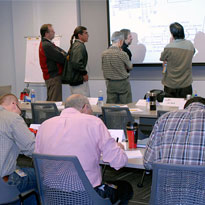LTE Functionality
- Course:LTE Functionality
- Course ID:LTE-FU Duration:4 days Where: Your Office (7+ Persons)
- Download Course Description (PDF)
Available as a private, customized course for your group at your offices or ours and in some cases as a WebLive(TM) class.
Course Outline
- Introduction to LTE/SAE
- Evolution of wireless networks
- 3GPP releases to date
- EPS (E-UTRAN and EPC) logical architecture
- EPS interfaces
- EPC (Evolved Packet Core) architecture
- SAE/LTE interfaces
- Radio Interface Principles
- Propagation characteristics
- Channel models
- Frequency selective channels
- Time dependent radio channels
- Multipath radio conditions: Delay, Doppler spectrum, multi-antenna channel model
- Macrocell propagation model: Urban case
- Macrocell propagation model: Rural case
- Exercises
- Modulation principles
- BPSK, QPSK, 16QAM, 64QAM
- OFDM: Principles of operation
- MIMO system
- Exercises
- LTE radio interface techniques
- Radio Interface techniques: Uplink/downlink
- Radio channel structure
- Radio interface
- Exercises
- Propagation characteristics
- Physical Layer Procedures
- Synchronization procedures
- Timing synchronization
- Radio link monitoring
- Intercell synchronization
- Power control: Uplink/downlink
- Random access procedures: Preample selection
- Channel quality: Channel Quality Indication (CQI) Report
- Precoding Matrix Indicators (PMI)
- Rank Indicator (RI)
- LTE Idle Mode Functionality
- Idle mode
- RRC states on idle mode
- PLMN selection
- Cell selection process: Criteria; normally camping
- Cell reselection evaluation process
- System information
- Paging; DRX for paging
- INTER-FREQUENCY cell reselection
- INTRA-FREQUENCY cell reselection
- INTER-RAT cell reselection
- SUBframe patterns
- Network compatibility (2G measurements RSSI, 3G measurements, WIMAX compatibility)
- Case studies: Analyzing optimization problems
- LTE Connected Mode Functionality
- MAC layer description
- HARQ process
- QoS profiling
- Scheduling: Scheduler introduction
- Scheduler examples: Vendor specific description
- Scheduler and Cell planning correlation
- Link Adaptation Function
- Feedback reports (PMI, CQI)
- Power control
- Exercises and planning considerations
- LTE Mobility Functionality
- LTE measurements and events
- Event triggered handovers
- Event triggered Release with Redirect
- Event triggered cell reselection
- Inter System Handovers (LTE to GSM, LTE to WCDMA)
- VoLTE: An introduction
- CS Fallback
- 3GPP features and performance enhancements
- Exercises and case studies
- Course Wrap-up : Recap and Discussion
Course in a Nutshell
This course will undertake an in-depth study of the LTE air interface. It will begin with a discussion of the radio channel environment and the related RF propagation issues to help you understand the problems that OFDM/MIMO solve. This is followed by a discussion of the modulation principles along with a detailed look at the LTE physical layer structure as it complements the modulation and MIMO channels. We conclude with a discussion of the LTE idle mode functionality and physical layer procedures with emphasis on the channel quality and random access techniques. Also connected mode — with emphasis on scheduler, power control and Link Adaptation — is further analyzed, and user mobility cases are explicitly presented with emphasis on parameter configuration and optimization.
Customize It!
- If some of your participants lack the necessary WCDMA/LTE background, we can teach an extended five-day course that includes WCDMA principles, LTE overview, and LTE air interface techniques.
- Add a workshop day at the end of the course, for a total of five days, for a deeper dive into capacity planning and coverage calculations.
Aimed At
Technical personnel with a good understanding of UMTS/WCDMA and some prior LTE background who wish to study LTE operations in depth.
Prerequisites
- LTE/SAE Technology (LTE-TECH, 3 days)
- LTE Air Interface Techniques (LTEAI, 4 days)
- UMTS (UMTS-FDD, 3 days)
The UMTS course, or equivalent knowledge/experience, is a required prerequisite for this course. LTE overview is recommended but not required.

